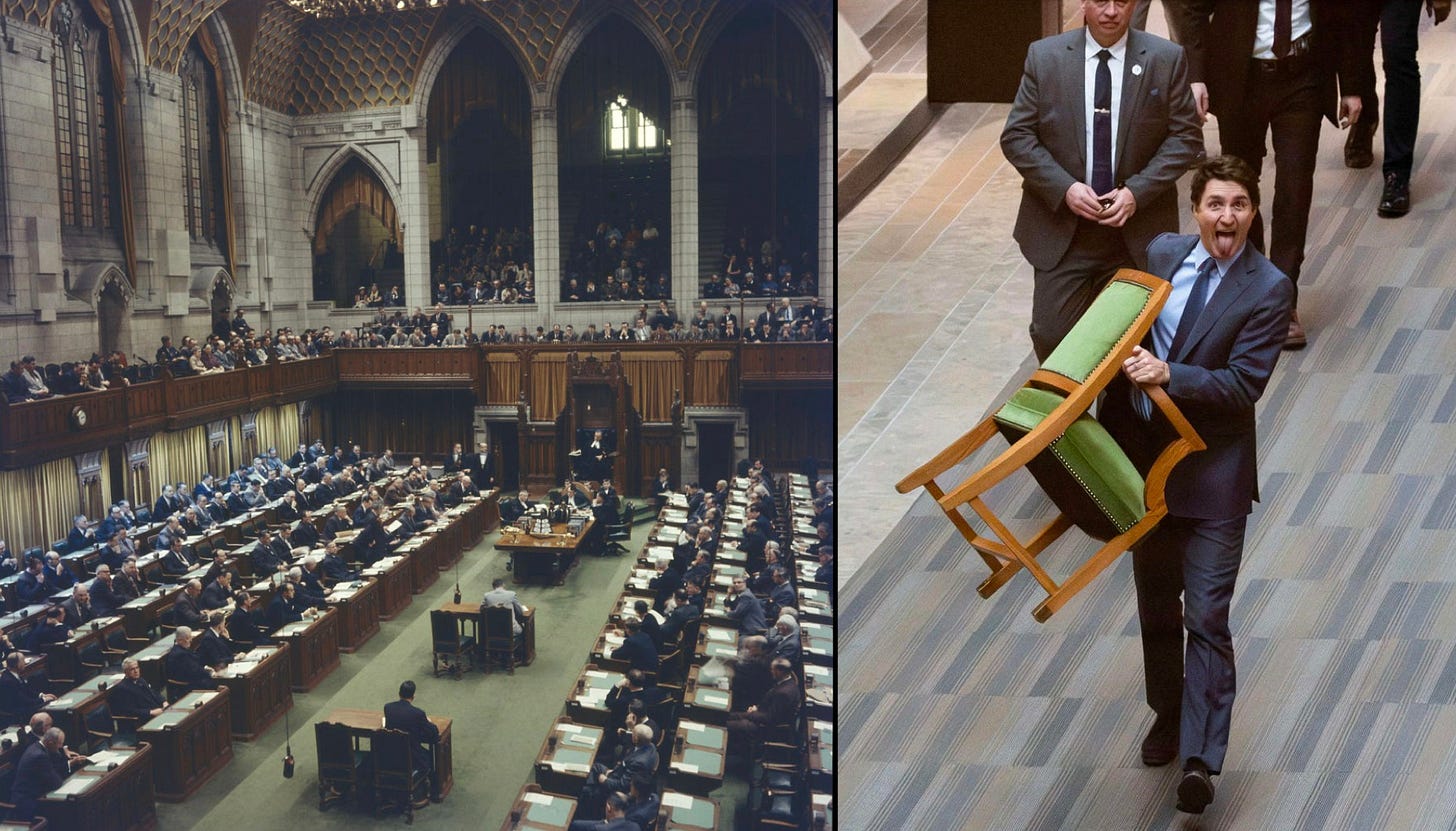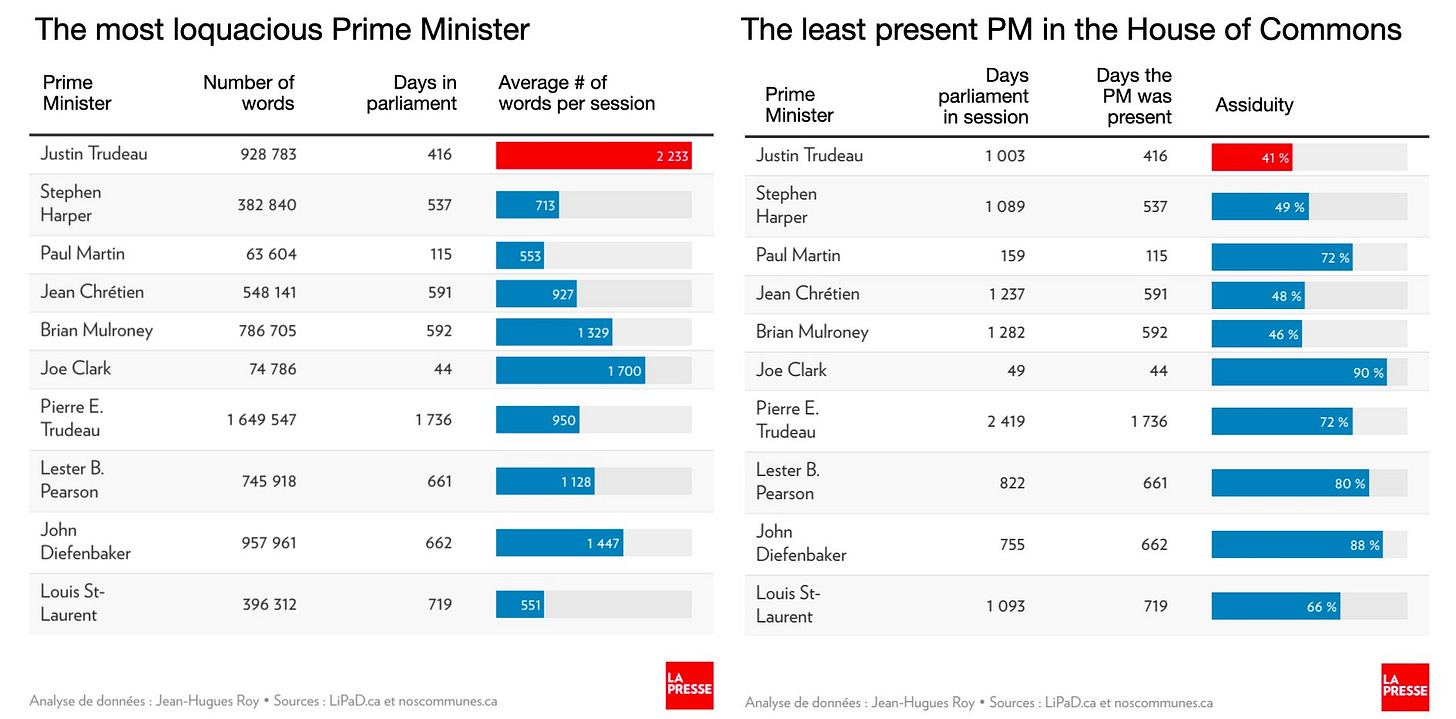Justin Trudeau was a big talker in the House, that is, when he showed up.
He also tended to repeat a narrower set of words. No wonder Canadians started tuning him out. Pierre Poilievre should take note.

A recent analysis highlighted in La Presse reveals a startling aspect of Prime Minister Justin Trudeau's oratory style. When assessed through a linguistic lens, Trudeau's vocabulary richness—or lack thereof—stands out, particularly when his word variety is measured against the total number of words he has spoken. This metric, known as a lexical richness index, positions Trudeau's vocabulary as one of the poorest among Canadian leaders in the past 75 years.
By dividing the number of distinct words used by each Prime Minister by their total word count, researchers can gauge the diversity of a leader's vocabulary. This analysis, part of a broader review of parliamentary language, suggests that Trudeau tended to repeat a narrower set of words more frequently compared to his predecessors.
However, Philippe Dubois, a specialist in political communication, cautions against a simplistic interpretation. He notes that the salient issues during a Prime Minister's tenure can significantly impact their lexical variety. For Trudeau, whose administration was heavily marked by the pandemic response, the focus on specific recurring themes such as "middle class," "family," and "climate" could naturally limit the breadth of his vocabulary in parliamentary addresses.
Comparing Trudeau to historical figures like Louis St-Laurent or John Diefenbaker, Laurence Arrighi, a linguistics professor, points out the changing expectations of political speech. Previously, leaders maintained a linguistic distance, using complex language as a tool of authority. Modern political communication, however, favours clarity and relatability, aiming to bridge the gap between leaders and the public. This trend toward simplification across the political spectrum may partly explain the observed decline in vocabulary diversity.
While Justin Trudeau's vocabulary lacked diversity, he compensated with his loquacity in the House of Commons. He spoke more words per appearance than any of his predecessors. This might suggest a robust engagement when present; however, a deeper dive into the data reveals a contrasting narrative regarding his attendance.
Impactful appearances over consistent attendance
An assiduity index, calculated from the number of days the Prime Minister is present at Parliament relative to the total days the House is in session, places Trudeau at a record high for absences. Simply put, while he spoke a lot when he was there, he was notably less present than one might expect from the leader of Canada.
This pattern of sparse attendance combined with verbose contributions when present raises questions about Trudeau's overall engagement with the parliamentary process. It could be argued that his approach leaned towards impactful, albeit infrequent, interventions rather than consistent participation. This strategy might resonate with a modern electorate that favours soundbites and significant gestures over steady presence, but it also opens the door to critiques of leadership commitment.
The balance between being vocally active yet physically absent paints a complex picture of Trudeau's leadership style. It suggests a prioritization of specific, possibly strategic, appearances that maximize impact over routine engagement. This could reflect a broader trend in politics where visibility is managed carefully to align with media coverage and public attention, potentially at the cost of regular parliamentary involvement.
As Canadians evaluate their options for Prime Minister in the next election, these insights into Trudeau's linguistic and parliamentary tactics may prompt a deeper reflection on what constituents expect from their elected leaders in terms of visibility and engagement.
Faced with a global stage where a neighbouring President has taken the 'Gish gallop' to unprecedented heights, perhaps voters will find appeal in an ex-banker's economy of words over a lifelong politician's verbosity. The choice might lean towards a leader whose succinctness can effectively counteract noise with clarity.





